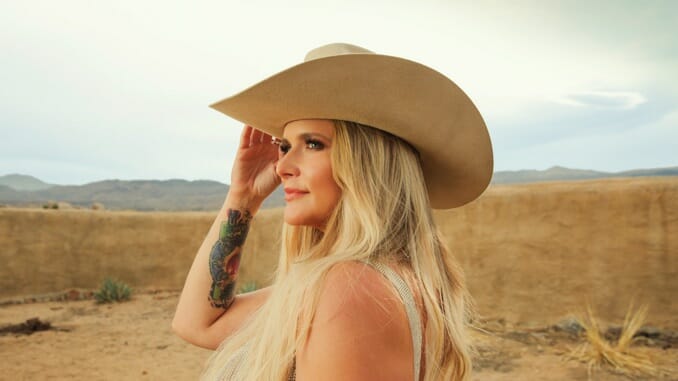Miranda Lambert: Always Wandering, Never Lost
Photo by Robert Ashcroft
Last year’s The Marfa Tapes was a radical departure for Miranda Lambert. Abandoning the radio-ready studio albums that made her a country-music star, she joined her comrades Jack Ingram and Jon Randall to record an album with three voices, two mics and two acoustic guitars on a mountain ridge near Marfa, Texas. The repertoire was 15 songs that the three had co-written over the previous six years during several visits to a nearby ranch. The one-take recordings left in the crackling fire, whistling wind, mistakes and chatter to create a rare sense of intimacy and spontaneity.
In its own way, though, Lambert’s new album, Palomino, is just as much of a bold move. True, it was recorded with a band in a Nashville studio and superficially sounds like her earlier work, but the tone and substance are different from anything she’s ever done. Country radio likes its songs either very upbeat or very sad—and Lambert has written and sung both kinds better than almost anyone. But now she’s mixing exhilaration and regret within the same song, creating a tension between them that might be confusing to those who crave the simplicities of young love or fantasy love. But that tension will be satisfying to those who crave the paradoxes of adult relationships.
“I put out The Marfa Tapes because I’d earned it,” Lambert says in a Zoom call from her Tennessee farm an hour from Nashville. Sitting under a chandelier, she has twin blonde braids sticking out from under a tan baseball cap. “And I took more chances with Palomino. This album has a little bit of that Flying Burrito thing, a little bit of Dwight Yoakam, that California-country thing. It reminds me of those records Rosanne Cash made with Rodney Crowell in the ’80s; those are some of my favorite albums. I wasn’t chasing that sound, but the music I love will inevitably seep into my own music. If I can take anything from Rosanne, Merle Haggard, Emmylou Harris, Steve Earle, it can only help.”
It does help. Those writers specialized in the bittersweet ironies of adulthood: the loneliness inherent in footloose freedom, the compromises necessary for long-term relationships, the tensions between romantic devotion and self-reliant independence, the price of ambition, the danger of desire. Now Lambert is exploring those same contradictions—not only in her lyrics but also in music that’s moodier in its harmonies and rougher and twangier in its guitars.
“When I started writing as a younger person,” she explains, “I just wrote about myself and what happened to me. Now I want to write like the artists and writers I’m drawn to, people like John Prine and Guy Clark. Those songs, like ‘Angel from Montgomery’ and ‘Desperadoes Waiting for a Train,’ had such depth. I wondered, ‘How did they get there? How did John Prine convince me that he was an old woman in Alabama, or that Guy was that old man in Texas?’ I wasn’t ready to do it before, but now I am. I finally got there by growing up a little bit.” She pauses and adds, “But not too much.”
Just as The Marfa Tapes resulted from three-person songwriting sessions at a Texas ranch, Palomino resulted from three-person songwriting sessions at Lambert’s farm in Tennessee, where she was joined by two of her longtime collaborators: Luke Dick and Natalie Hemby. They gathered in the fall of 2020, when the pandemic was still going strong, to see what might happen.
“It’s not like we start writing as soon as we get there,” Lambert explains. “We bring our axes and our song ideas, but we also bring drinks and smokes. We get on the paddle boards in my pond, tear around the property on ATVs and just relax into a writing mood. We were sitting around, and Luke started playing my guitar that Merle signed, obviously that’s a special guitar for me. Luke came up with that line, ‘There’s always been a stranger in my soul,’ because of Merle’s band, The Strangers. We started talking about situations where you feel like a stranger, an outsider, a tourist, and that led to that song ‘Tourist.’”
At first, it sounds like yet another tribute to the freedom of life on the road. “Swap a story, share a beer,” Lambert chirps over an easy-rolling guitar figure, “Feel the itch that makes me wanna move.” But soon a darker undercurrent slips in. An eerie pedal steel bends the harmony and a vibrato-heavy guitar stutters while Lambert sings, “I don’t know where I belong / It might sound foolish, yeah, but nowhere feels like home.” But it’s not like this uneasy chorus overwhelms the happy-go-lucky verses; it’s more that these contradictory moods are pressed together like two sides of the same coin.
“I’ve been traveling since I was 17,” Lambert confesses, “and I’ve always had the itch to roam. I’m so into it that I’ve because a collector of vintage trailers—Fleetwood and Airstream. The road is my safe haven; roaming around is where we singer/songwriters feel at home because that’s how we make our living, so that’s how we spend most of our time. A lot of it is great: You meet these strangers and have these experiences, things you would never have done if you weren’t on the road.
-

-

-

-

-

-

-

-

-

-

-

-

-

-

-

-

-

-

-

-

-

-

-

-

-

-

-

-

-

-

-

-

-

-

-

-

-

-

-

-








































